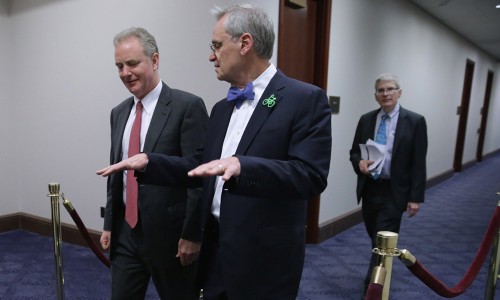Military veterans are a step closer to getting easier access to medical marijuana in states where it’s legal after a U.S. House vote in favor of a budget measure Thursday.
The measure, which is a part of an $81.6 billion bill funding military construction and veterans programs, would allow doctors with the Department of Veterans Affairs to talk with their patients about medical marijuana and make recommendations for treatment, which is something they are currently unable to do. A similar provision was approved in a Senate bill on military health spending.
RELATED: Why do some Colorado politicians oppose medical pot for veterans?
Proposed by Rep. Earl Blumenauer (D-Ore.), the House measure is an amendment to a Department of Veterans Affairs appropriations bill and passed by a 44-vote margin, marking “the strongest sign yet that attitudes in Congress toward the drug are shifting along with public sentiment,” according to Bloomberg Politics.
Pot and PTSD
Seeking help: Veterans with PTSD are turning to pot, without the research to back them
A quest to reduce suicide rates: Washington state veterans form support group to promote medical pot
Scathing report: Think tank accuses government of stifling marijuana research
Weed news and interviews: Get podcasts of The Cannabist Show.
Subscribe to our newsletter here.
Watch The Cannabist Show.
Peruse our Cannabist-themed merchandise (T’s, hats, hoodies) at Cannabist Shop.
It’s the third such attempt seeking Congressional approval; a similar measure in 2015 failed on a 213-210 House vote, and two years ago, it was rejected by a 222-195 vote.
The Bloomberg report continues:
Currently, veterans have to hire an outside physician at their own expense to get such treatment, an “unjustified” hurdle affecting some veterans struggling with post-traumatic stress disorder, depression and chronic pain and who might benefit, Blumenauer said.
“We should not be limiting the treatment options available to our veterans,” said Blumenauer, whose home state is among 24, along with the District of Columbia, that have laws legalizing medical marijuana.
Representative Charlie Dent, a Pennsylvania Republican, said during floor debate Wednesday night that he opposes the policy shift, albeit reluctantly. Dent said that he was “uncomfortable in trying to dictate policy on marijuana” without guidance from the U.S. Food and Drug Administration and other medical professionals.
Blumenauer retorted that the amendment doesn’t dictate anything, but instead would “simply enable doctors and patients to interact with a state’s legal marijuana systems.”
As The Associated Press’ Ben Finley found in March, the number of veterans turning to cannabis for treatment of PTSD — in legal states or not — is on the rise. However, opponents argue that veteran patients are at risk for dependency issues, officially known as “cannabis use disorder.” Finley explains:
Since 2002, the percentage of PTSD-afflicted veterans who have been diagnosed with marijuana dependence has climbed from 13 percent to nearly 23 percent, according to VA data released last year. That translates to more than 40,000 veterans.

A study as such is just another reason for regulated, safe access, which groups like the National Cannabis Industry Association (NCIA) continues to fight for.
“This is a policy that is long overdue, and it’s good to see such strong support for it in the House,” said NCIA executive director Aaron Smith in a news release. “Medical marijuana has huge potential benefits for many of the issues that military veterans deal with, and it’s unconscionable to muzzle their doctors from talking about it.”
